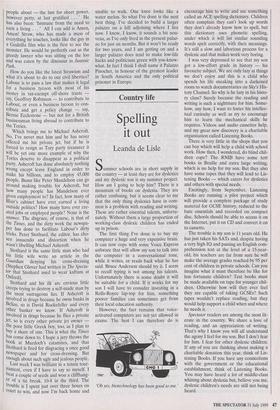Country life
Spelling it out
Leanda de Lisle
Summer schools are in short supply in the country — at least they are for dyslexics and my dyslexic son is my summer project. How am I going to help him? There is a mountain of books on dyslexia. They are rather confusing, but it seems clear to me that the only thing dyslexics have in com- mon is a problem with reading and writing. These are rather essential talents, unfortu- nately. Without them a large proportion of working-class dyslexic children has ended up in prison.
The first thing I've done is to buy my computer a huge and very expensive brain. It can now cope with some Voice Express software that will allow my son to talk into the computer in a conversational tone, while it writes, or reads back what he has said. Bruce Anderson should try it. I seem to recall typing is not among his talents. Unfortunately there is some doubt it will be suitable for a child. If it works for my son I will have to consider investing in a Rolls-Royce lap-top for him, something poorer families can sometimes get from their local education authority.
However, the fact remains that voice- activated computers are not yet allowed in exams. The best I can therefore do is `Oh yes, biotechnology has been good to me.' encourage him to write and use something called an ACE spelling dictionary. Children often complain they can't look up words they don't already know how to spell, but this dictionary uses phonetic spelling, under which it will list similar sounding words spelt correctly, with their meanings. It's still a slow and laborious process for a dyslexic and that makes work very boring.
I was very depressed to see that my son got a low-effort grade in history — his favourite subject. We are only lazy at things we don't enjoy and this is a child who spends his life sneaking into a darkened room to watch documentaries on Sky's His- tory Channel. So why is he lazy in his histo- ry class? Surely because the reading and writing is such a nightmare for him. Some- how, any how, I want to foster his intellec- tual curiosity as well as try to encourage him to learn the mechanical skills he requires. Videos and audio cassettes help, and my great new discovery is a charitable organisation called Listening Books.
There is very little in the shops that you can buy which will help a child with school work. How then, I wondered, do blind chil- dren cope? The RNIB have some text books in Braille and extra large writing, which is no help for my son. But they also have some tapes that they will lend to Lis- tening Books — which caters for dyslexics and others with special needs.
Excitingly, from September, Listening Books are running a pilot project which will provide a complete package of study material for GCSE history, reduced to the bare essentials and recorded on compact disc. Schools should be able to access it on the Internet, put it on CD and convert it on to cassette.
The trouble is my son is 11 years old. He has just taken his SATs and, despite having a very high IQ and passing an English com- prehension test at the level of a 15-year- old, his teachers are far from sure he will make the average grades reached by 95 per cent of children in private schools. Can you imagine what it must therefore be like for less fortunate children? Text books must be made available on tape for younger chil- dren. Otherwise how will they ever feel they are capable of taking GCSEs? Such tapes wouldn't replace reading, but they would help support a child when and where he needs it.
Spectator readers are among the most lit- erate in the country. We share a love of reading, and an appreciation of writing. That's why I know you will all understand the agony I feel for my son. But I don't fear for him. I fear for other dyslexic children. If any of you are thinking about making a charitable donation this year, think of Lis- tening Books. If you have any connections with the government or the educational establishment, think of Listening Books. You may have heard a lot of middle-class whining about dyslexia but, believe you me, dyslexic children's needs are still not being heard.


























































 Previous page
Previous page